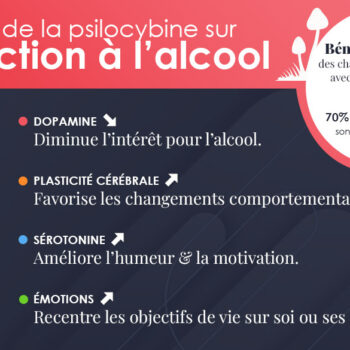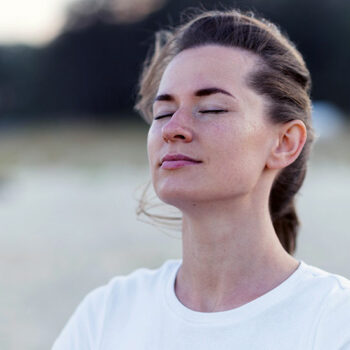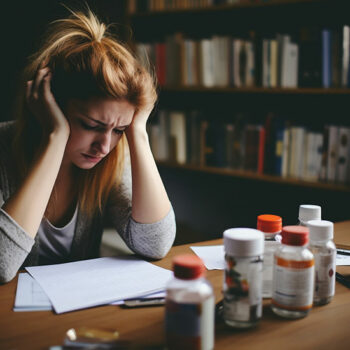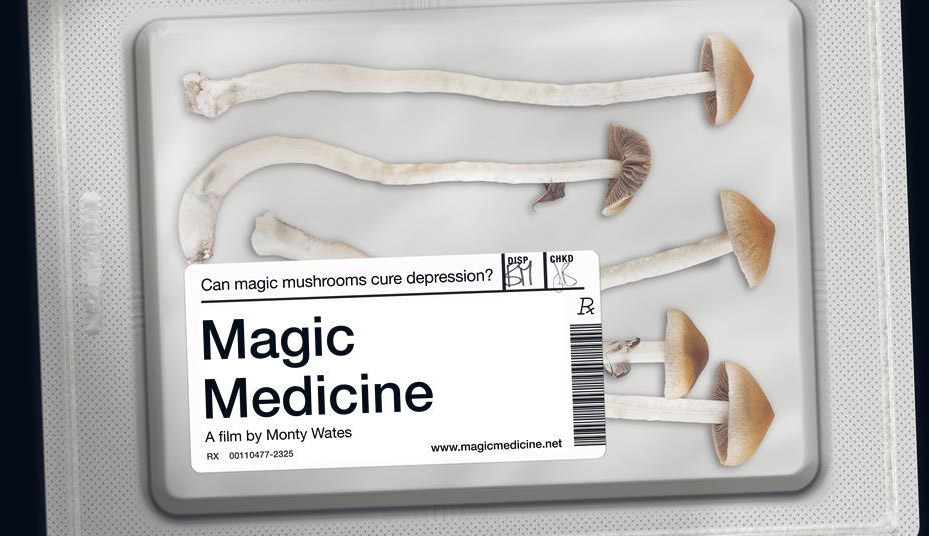
Available on : Netflix Production date : 2018 Directed by : Monty Wates Duration : 79 minutes
Official website
Synopsis of Magic Medicine
What if magic mushrooms were just as good as chemical antidepressants at treating chronic depression? It may not seem like it, but for the scientific community, this simple question has started a real revolution. In any case, this is the hypothesis put forward by the psychologist and neuroscientist Robin Carhart-Harris in the Netflix documentary Magic Medicine: Can magic mushrooms cure depression?
His experiments at Imperial College London have helped push psilocybin mushrooms into the spotlight, both because of the significant conclusions drawn from them and for the difficulties encountered. Netflix offers viewers this touching film following the first psilocybin medical trials. The documentary succeeds in remaining objective and scientific, without championing magic mushrooms.
Taboos that are hard to shake off
For many, this Netflix documentary was an opening into the world of psychedelics and their potential role in treating depressive disorders. Other documentaries also deal with hallucinogenic substances or psychoactive drugs such as Ayahuasca, Peyote, LSD, or MDMA.
The four-year fight to experiment with psilocybin
Other than experiments on patients suffering from depression, Monty Wates’ film also deals with the difficulty that researcher Robin Carhart-Harris encountered in obtaining authorization to test his hypothesis of prescribing psilocybin to a dozen volunteers and studying how mind-altering substances can be used for medical purposes in a strictly controlled setting. After all, psilocybin is a controlled-substance that’s still banned in most parts of the world since the 1960s and 1970s.
Because psilocybin therapy is not legal in the UK, Robin Carhart-Harris jumped through hoops for the British authorities for more than three years to get permission to prescribe a dozen volunteers with psilocybin. In the end, he managed to get his hands on the precious authorisation necessary to carry out his experiments.
A very human story
The film follows three British men between 35 and 60 years old who suffer from severe and persistent depression that’s resistant to known chemical treatments. The men’s stories are told over three phases – before, during, and after the experiment – as we discover the effects of psilocybin on their day-to-day lives. We meet them before they have ingested the magic-mushroom molecule and started tripping.
The distress left behind by depression medication
This psychedelic documentary’s first strong point is that it gives a voice to those suffering from depression and allows them to explain how depression progressively took over their lives and social relationships. Like many people struggling with depression, they’ve found themselves stuck in the same situation for many years.
Each of the three stories is deeply moving, and the images allow us to understand just how powerless they are in the face of their illness. Their distress is palpable and, whatever your personal stance on the experiment, you really want it to work – just for them!
For the men, the Netflix documentary is an opportunity to express the hope they place in a medical-use of psilocybin, since other treatments are ineffective.
The experiment in the Netflix show
The Imperial College London researcher offered a dozen people the opportunity to take two different doses of psilocybin in two separate sessions and remain under professional surveillance at the hospital for the six hours following a dose. The documentary doesn’t show how the patients were selected, but they all seem keen to take part.
A mystical ceremony, but without any ceremony
Each patient is supported by two researchers, who interact with them when the psychedelic trip begins to take effect. They reassure them in case of worry about hallucinations and alternate between discussing with the patients and remaining quiet.
You get a real sense of the researchers’ involvement and empathy towards the participants and their families, but you can’t help thinking that the experiment is all a bit cold. Surely it’s difficult to feel fully at ease in a hospital room? Surely the vaguely spiritual decorations – a candle and some wall hangings – don’t do enough to create the ideal relaxing surroundings?
An ancestral shamanic ritual could have been more appropriate in this context. The benefits of taking psilocybin are easier to tap in to when the mind and emotions are conditioned in the right atmosphere. Still, perhaps all of these very subjective parameters aren’t compatible with carrying out the very first series of rigorous scientific experiments into the subject.
A journey that deserves guidance
The Netflix documentary shows the patients reacting with various intensity to taking psilocybin. The feelings that come up during the psychedelic trip can be overwhelming and are often linked to childhood traumas or pain. Indeed, ingestion of the hallucinogenic mushroom causes an alteration of consciousness in these patients, which revives buried memories at the unconscious level. Under the supervision of the professional, participants therefore confront a hidden part of their mind in the form of a sensory flashback.
You also get a glimpse at why proper guidance is essential for accompanying the participants towards a serene experience, and why psychedelic mushrooms should never be taken without professional guidance. Nevertheless, Robin Carhat-Harris and his team remain in close proximity to their patients and interact a lot with them. But could such close proximity actually hinder participants’ ability to fully let go?
Enjoy a 100% legal psilocybin experience in the Netherlands
Preparation and retreat in English
Enjoy a legal & intense experience in the Netherlands
A psychedelic retreat designed for best results: small group, one-to-one preparation, experimented facilitators, 1 year monthly integration & awesome place !
Join us
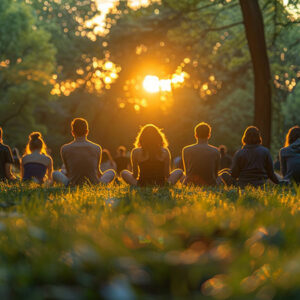
What are the effect of the psilocybin ?
It’s difficult not to be moved by the story of a father who is finally able to spend time with his wife and children when he was incapable of it before. Just seeing how a simple stroll or family get-together brings him a new sense of joy, we begin to understand how severe things get for those that suffer in silence. The interview with the children talking about their father’s illness is a real stand-out moment in the documentary – you can’t help feeling moved by their maturity.
Of the three patients, none are completely cured of depressive symptoms after just one dose. Magic Medicine: Can magic mushrooms cure depression? doesn’t champion psilocybin as a miracle cure for depression.
It does, however, give us food for deeper thought. After some deep personal soul-searching to interpret their psychedelic experience, one of the patients reports a tangible reduction in certain symptoms. The father we meet seems to go back to leading a normal life for a few months, until finally the effects of the mushroom wear off. As for the third man, he benefited from the effects of the mushroom for a few days, but quickly found himself back in the same psychological imbalance. To this stage, there may not always be long-term effects or a sensation of definitive healing.
A long road ahead
So, what now? Does this mean that taking multiple psilocybin mushroom doses over a period of time could replace antidepressants? Could it one day be possible, under the influence of psilocybin, to do away with daily psychopharmacology? Neither the documentary nor the results of the experiment can lead us to that conclusion yet.
Robin Carhart-Harris’s conclusions about psilocybin are positive, but that doesn’t equate to scientific proof that the psychoactive molecule in question is truly effective.
- One week after taking psilocybin, almost all of the patients in the study noticed a significant reduction in depression (BDI score reduction of over 20 points for 11 out of 12 patients).
- Three months after the experiment, 10 of the 12 patients reported sustained improvements (average BDI score reduction of over 25 points for six out of the 12 patients, and 15 points for four others).
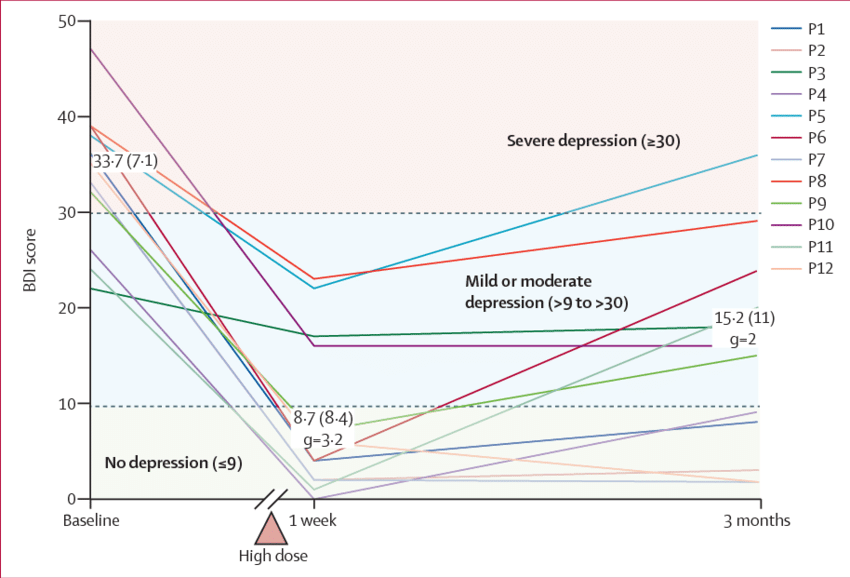
May 2016, The Lancet Psychiatry 3 | Auteurs : Robin L Carhart-Harris, Mark Bolstridge, James Rucker & Camilla Day
What can we take home after watching Magic Medicine?
Firstly, kudos goes to Netflix for choosing to add the film to their catalogue (it also used to be available on Apple TV). The streaming platform offers us this original, high quality content that will certainly interest viewers interested in scientific and neuroscientific research.
Magic Medicine only shows the use of psilocybin in a scientific and medical setting, so it doesn’t make light of the drug. The risks of bad trip or the side effects of hallucinogenic mushrooms are real, especially for people suffering from psychosis (psychiatric disorders like Schizophrenia or Bipolar disorder) or in case of a dosage error.
With its measured and honest tone, the film certainly doesn’t encourage people to take psychedelic substances. Instead, it offers viewers a realistic vision and doesn’t shy away from showing the less successful part of the study (there are patients for whom psilocybin has no effect). It teaches us that continued research is required if we’re to get the most out of the potential medical benefits that psilocybin may have to offer and better understand its influence on serotonin receptors, a neurotransmitter responsible for regulating mood, motivation, and emotions.
A potential therapeutic relief
In any case, the results we see are striking. The scientist describes taking a single dose of psilocybin truffle as a potential therapeutic relief that needs further research and experimentation. As it is not addictive and does not create dependence, it might be erroneous to categorize psilocybin too quickly and without nuance among harmful or dangerous hallucinogenic drugs. Magic mushrooms probably do need to be regulated, but it may well not be a good idea for governments to impede on scientific research into the subject, especially at a time when 4.4% of the world’s population suffers from depression.
In addition to Netflix, you can also watch the documentary Magic Medicine on YouTube :
Sign up for our newsletter
to receive exclusive information on psychedelic news and our events.

